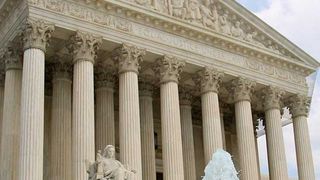Kavanaugh Tapped for High Court

U.S. Court of Appeals for the D.C. Circuit judge Brett Kavanaugh has been tapped by President Donald Trump to succeed Justice Anthony Kennedy on the Supreme Court.
President Trump, who announced the pick at the White House Monday (July 9) in primetime, said Kavanaugh had "impeccable credentials" and a commitment to equal justice under the law.
Kavanaugh said he had witnessed the President's appreciation of the vital role of the judiciary, and said no President had talked to more people from more backgrounds in making his pick.
Kavanaugh said his mother taught him the value of equality for all Americans, passed down from a mother who was first a teacher, then a prosecutor and trial judge.
A judge must interpret the Constitution as written, he said, something he has taught to law students—he pointed out he had been hired to teach at Harvard by then Judge (now Justice) Elena Kagan.
He said he would begin meeting Tuesday with members of the Senate and that he would tell each of them that an independent judiciary was a "crown jewel." He promised to keep an open mind, but that he would preserve the Constitution and the rule of law.
The announcement began what is expected to be a protracted and contentious effort to get his nomination through angry Democrats and perhaps a couple of moderate Republicans who support Roe v. Wade.
Broadcasting & Cable Newsletter
The smarter way to stay on top of broadcasting and cable industry. Sign up below
"Senate liberals know that we have the opportunity to reshape the Supreme Court for an entire GENERATION, and they are ready to obstruct and unleash a smear campaign against our nominee," the President said in an e-mail to supporters following the announcement. He called on those supporters to sign a petition telling those "obstructionist" senators to confirm him.
The D.C. Circuit is the principal court of jurisdiction for challenges to FCC decisions, so Kavanaugh is a familiar face in communications circles, particularly for his skepticism about network neutrality rules.
Related: Supreme Court Justice Kennedy Exiting Court
CNN legal analyst Jeffrey Toobin called him an accomplished judge—he has been on the court that produced Chief Justice John Roberts, Ruth Bader Ginsburg, Antonin Scalia and Clarence Thomas—so the issue of competence is essentially off the table.
On the communications docket, Kavanaugh wrote the majority opinion finding that the FCC was within its authority to seek more input before deciding whether to require broadcasters to simulcast emergency alert information in languages other than English.
He was with the majority that found that Comcast had not violated program carriage rules, writing: "In restricting the editorial discretion of video programming distributors, the FCC cannot continue to implement a regulatory model premised on a 1990s snapshot of the cable market."
"We believe that the Court of Appeal's unanimous ruling in the Tennis Channel case provides important guidance for the Commission concerning the need to construe and apply the statute narrowly, as Congress intended, NCTA said in a statement,. "This is particularly true in light of today's highly competitive video marketplace and the First Amendment interests at stake. As Judge Kavanaugh wrote: "In restricting the editorial discretion of video programming distributors, the FCC cannot continue to implement a regulatory model premised on a 1990s snapshot of the cable market.'"
Related: Judge Kavanaugh on Trump Short List for Court
He also dissented from the Circuit's decision not to grant IPs request for an en banc review of the decision upholding the FCC's Title II-based internet order. He said the order was unlawful and should have been vacated.
CNN's Jake Tapper pointed out that Kavanaugh once wrote that President should not have to be "bothered" with lawsuits and other legal complications, which would have been an attractive position for a President who has been subjected to various lawsuits.
It didn't take long for the pushback to begin. Even before the announcement was made, Democracy for America Chair Dean Trump said: "Donald Trump's decision to nominate a reactionary ideologue like Brett Kavanaugh and shift the balance of the U.S. Supreme Court even further right represents a generational assault on justice, freedom, and our country's core democratic values.
Kavanaugh was appointed to the circuit in 2006 by President George W. Bush, for whom he had been Assistant to the President and Staff Secretary to the President.
If Kavanaugh is confirmed, he probably won't have to worry about recusals based on financial holdings.According to his 2017 financial disclosure statement obtained by Fix the Court, under investments Kavanaugh lists only an interest-bearing accounting in Bank of America and the Texas retirement system Vanguard account, the latter likely his wife's account, said a court watcher.
Kavanaugh, a former Kennedy clerk, was part of the Ken Starr Clinton impeachment team and the Bush election team, so there are plenty of red flags for Democrats who were already planning strong opposition to any of the potential conservative candidates to the court.
Contributing editor John Eggerton has been an editor and/or writer on media regulation, legislation and policy for over four decades, including covering the FCC, FTC, Congress, the major media trade associations, and the federal courts. In addition to Multichannel News and Broadcasting + Cable, his work has appeared in Radio World, TV Technology, TV Fax, This Week in Consumer Electronics, Variety and the Encyclopedia Britannica.

